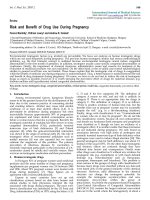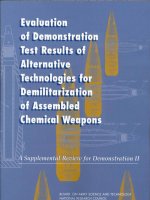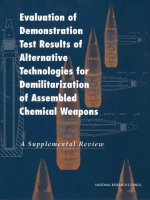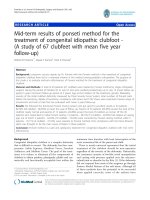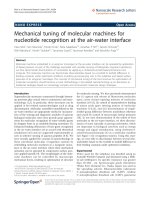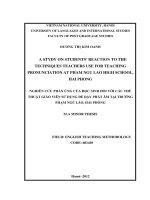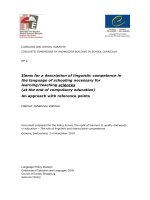Results of drug use for medical insurance at 105 Military Hospital from 2015 to 2017
Bạn đang xem bản rút gọn của tài liệu. Xem và tải ngay bản đầy đủ của tài liệu tại đây (58.33 KB, 6 trang )
Journal of military pharmaco-medicine no5-2019
RESULTS OF DRUG USE FOR MEDICAL INSURANCE
AT 105 MILITARY HOSPITAL FROM 2015 TO 2017
Ho Canh Hau1; Pham Luong Ngoc1; Nguyen To Hieu1
Nguyen Minh Chinh2; Hoang Hai2
SUMMARY
Objectives: To do a research on drug use results for health insurance subjects at 105 Military
Hospital from 2015 to 2017. Research methods: Retrospective study. Results and conclusion:
Building unscientific plans, its value in 2017 was 2 times higher than in 2016; there was no
continuity and logicality in the preparation of bidding documents for 3 years from 2015 to 2017;
bidding organizations can only buy 75 - 88% of the plan; bidding time in 2015 was 74 days,
in 2016 it was 130 days and in 2017, it took 185 days. Bidding results in 2015 and 2016
exceeded 50%, in 2017 only about 50%. Conclusion: Preparing plans and bidding documents
that are not scientific; the winning result is low (75 - 88%); it takes long time to hold a bidding.
Expenditure for drug use is not reasonable.
* Keywords: Results of drug use; Medical insurance; 105 Military Hospital.
INTRODUCTION
Health insurance (HI) is a form of
insurance applied in the field of health
care, non profit, organized by the state
and the objects have the responsibility to
participate in accordance with the provisions
of law on HI [1]. Thus, HI is a preeminent
policy, taking human health care as a
center on a highly community-based
organization to share risks when unfortunately
suffering from illness and disease. The
universal HI (UHI) model is an important
policy of countries around the world [2].
Currently. UHI has been successfully
implemented in some developed countries
[3]. In Vietnam, the policy of UHI is mentioned
by Politburo Resolution No. 46/NQ-TW
[4]. The roadmap for implementing UHI is
to target by 2020, 80% of the population
will participate in HI.
105 Military Hospital is a military
hospital with the task of examining and
treating for many subjects (military, policy,
HI, medical services). In recent years, the
Hospital has focused on improving the
technical and professional qualifications
to meet the new tasks of the Party and
the Government that are implementing
UHI. Therefore, this research contributes
to improve the quality of health care for
the army and the people.
1.105 Military Hospital
2. Vietnam Military Medical University
Corresponding author: Ho Canh Hau ()
Date received: 16/04/2019
Date accepted: 20/05/2019
136
Journal of military pharmaco-medicine no5-2019
SUBJECTS AND METHODS
1. Subjects.
Data on drug use, medical records and patient questionnaires.
2. Methods.
Retrospective description combined with ABC/VEN matrix analysis.
RESULTS
1. Structure of drug use according to ABC analysis.
The structure of drug list for 3 years (2015 - 2017) was shown in table 1 and table 2.
Table 1: Structure of drug list according to ABC analysis.
Year
2015
2016
2017
Group
Number
%
Number
%
Number
%
A
60
16.85
55
15.54
74
17.05
B
54
15.17
55
15.54
78
17.97
C
242
67.98
244
68.93
282
64.98
356
100
354
100
434
100
Total
In 2015, drugs of group A accounted for 16.85%, drugs of group B accounted for 15.17%
and drugs of group C had the largest number accounting for 67.98%. These rates were
quite similar in the next 2 years.
The ratio of the value corresponding to the quantity was shown in table 2.
Table 2: Structure of drug value according to ABC analysis.
Unit: million VND
Year
Group
2015
2016
2017
Value
%
Value
%
Value
%
A
12.360
75.18
15.966
75.16
24.193
75.14
B
2.483
15.10
3.218
15.15
4.839
15.03
C
1.598
9.72
2.060
9.70
3.166
9.83
Total
16.441
100
21.244
100
32.198
100
- Group A: In order to achieve about 75% of the budget, in 2015, it needed 16.85%
of the number, whereas this rate in 2016 was 15.54% and it was 17.05% in 2017.
- With a rate of about 15% of the budget of group B in 2015, the rate of drugs was
15.17%, it was 15.54% in 2016 and it was 17.97% in 2017.
- Group C: In order to achieve about 10% of the budget, in 2015 it needed 67.98%
of the number of drugs, 68.93% in 2016 and 64.98% in 2017.
137
Journal of military pharmaco-medicine no5-2019
2. Structure of drug use according to VEN analysis.
Table 3: Structure of drug list according to VEN analysis.
Year
Group
2015
2016
2017
Number
%
Number
%
Number
%
V
83
23.31
94
26.55
98
23.04
E
209
58.71
209
59.04
278
64.06
N
64
17.98
51
14.41
56
12.90
Total
356
100
354
100
434
100
- Proportion of group V drugs used in 3 years was not equal over the years: in 2015
this rate was 23.31%, it was 26.55% in 2016 and 23.04% in 2017.
- The rate of drug use of group E was the highest and gradually increased over the
years from 58.71% in 2015 to 64.06% in 2017. Meanwhile, the rate of using group N
drugs was the lowest and there was gradual decrease over 3 years (from 17.98% in
2015 to 12.90% in 2017).
Table 4: Structure of drug value according to VEN analysis.
Unit: million VND
Year
2015
2016
2017
Group
Value
%
Value
%
Value
%
V
2.036
12.38
5.405
25.44
7.162
22.24
E
11.042
67.16
12.666
59.62
20.964
65.11
N
3.363
20.45
3.173
14.94
4.072
12.65
Total
16.441
100
21.244
100
32.198
100
- The rate of drug use by value of group V, E and N increased and decreased
unevenly over the years. In particular, the rate of group E utilization was still the highest
(accounting for 67.16% in 2015, 59.62% in 2016 and 65.11% in 2017).
- The rate of drug use of group N (group of essential drugs) was still quite high,
which in 2015 was higher than the group of essential drugs V (accounting for 20.45%)
and gradually decreased in the remaining 2 years (the rate corresponding with the
years 2016 and 2017 was 14.94% and 12.65%). Some drugs of group N: glucosamine
250 mg, ginkgo biloba 40 mg, alphachymotrypsine...
- Proportion of drug use according to VEN analysis between quantity and value: The
rate of drugs use belonging to group E both the number of items and corresponding
values was much higher than the remaining 2 groups (group V and group N). The rate
of use between the number of items and the corresponding value of group V and group
N increased, decreased unevenly over 3 years.
138
Journal of military pharmaco-medicine no5-2019
3. Analyze the use of drugs according to the ABC/VEN matrix.
Table 5: Structure of drug list according to the ABC/VEN matrix.
Year
2015
2016
2017
Mean value
Group
Number
%
Number
%
Number
%
I
136
38.20
136
38.42
158
36.41
37.41 ± 1.01%
II
181
50.84
187
52.82
246
56.68
54.75 ± 1.93%
III
39
10.96
31
8.76
30
6.91
7.83 ± 0.92%
Total
356
100
354
100
434
100
100%
The ratio of the amount used in the highest 3 years was group II and the lowest was
group III, in which:
- Group I was the most important group of drugs containing the most necessary
drugs (group V) or drugs with the most value for using the most budget (group A), need
special attention to account for an average rate of 37.41 ± 1.01%.
- Group II (important group) accounted for an average rate of 54.75 ± 1.93%.
- Group III (less important group) accounted for an average rate of 7.83 ± 0.92%.
Table 6: Structure of drug value by ABC/VEN matrix.
Unit: million VND
Year
Group
2015
2016
2017
Mean value
Value
%
Value
%
Value
%
I
13.424
81.65
17.333
81.59
26.198
81.37
81.54 ± 0.12%
II
2.695
16.39
3.637
17.12
5.630
17.49
17.00 ± 0.46%
III
322
1.96
274
1.29
370
1.15
1.47 ± 0.35%
16.441
100
21.244
100
32.198
100
100%
Total
The rate of drug use value for groups decreased over 3 years from group I to group III.
The average use for group I was 81.54 ± 0.12%, group II: 17.00 ± 0.46% and group III:
1.47 ± 0.35%.
Proportion of quantity and use value: Although the number of group II was higher
than the other two groups, the use value of group I was the highest, especially in group III
(low value drugs, high number of use - group C and non-essential - group N), this rate
was low (1.47%).
139
Journal of military pharmaco-medicine no5-2019
Table 7: Group A drug results in ABC/VEN matrix by value (million VND).
Year
2015
Group
2016
2017
Value
%
Value
%
Value
%
AV
972
7.86
4.305
26.52
5.374
21.74
AE
8.740
70.71
9.516
58.62
16.397
66.35
AN
2.648
21.42
2.412
14.86
2.943
11.91
Total
12.360
100
16.133
100
24.714
100
Large-cost drugs focus mainly on essential drugs (group E). Non-essential medicine
group with high value also accounted for a high proportion over the years: in 2015 it
accounted for 21.42% (higher than the AV group of 7.86%), it accounted for 14.86% in
2016 and it was present in 11.91% in 2017. This shows that non-essential drugs are
abused in hospitals.
Thus, it is necessary to have the attention on the hospital's drug and treatment
committee to be included in the annual shopping list of the hospital in order to bring
efficiency in drug use, save the budget for drug procurement for HI, limiting abuse of
non-essential drugs and drugs of great value.
4. Survey results of some drug use indicators.
Through a survey on drug use indicators in 2007 at 105 Military Hospital, following
the guidance of Circular No.21/TT-BYT, the results were shown below:
- About the average coordination amount in a single application:
+ 601 inpatient medical records were included in the study. The average combination
result in one application: 5.011 ± 2.197 (drug/single). Of which, the maximum number
of combination drugs/single was 12 and the number of combination drugs was at least
1.0/single.
- About adverse interactions in drug coordination:
Interactive assessment according to Food and Drug Administration (FDA) was
shown below:
Table 8: Pairs of adverse interactions in drug use coordination.
Number
Interaction level
Pair number
%
Number of medical records
1
Severity
6
12.2%
6
2
Medium
38
77.6%
118
3
Low
5
10.2%
8
49
100%
132
Total
The number of adverse medical records was quite high: 132/601 patients had
adverse interaction accounting for 21.9%. There were 49 interactive couples out of a
total of 132 interactive medical records (because one medical record may have one or
more interactive pairs).
140
Journal of military pharmaco-medicine no5-2019
Interaction occurs at 3 levels:
+ The severity: 6 pairs accounted for
12.2%, occurred in some pairs: spironolacton perindopril; ciprofloxacin - methylprednisolon;
ciprofloxacin - theophylin; ketorolac diclofenac...
+ Moderate (medium level): Common
pair of interactions, with 38 pairs,
accounting for 77.6%: cefotaxim gentamicin; diazepam - perindopril;
furosemid - ketorolac...
+ Light level: 10.2%, occured in some
pairs: aspirin - spironolacton; atropine nitroglycerin...
CONCLUSION
Structure of using drugs according to
ABC analysis: Group A needed about
16 - 17% of the amount to achieve about
75% of the budget. Group B needed about
15 - 18% of the amount to reach about
15% of the budget. Group C: Only about
10% of the budget achieved 65 - 69% of
the amount.
Structure of drug use according to
VEN analysis: The rate of using drugs
group V: from 23 to 27% in terms of use,
accounting for 12 - 25% of the fund. The
rate of using drugs group E: from 59 - 64%
of the amount, accounting for 60 - 67% of
the fund. The rate of drugs use in group
N: from 13 - 18% of the amount, accounting
for 13 - 20% of the expenditure.
Analysis of drug use according to the
ABC/VEN matrix: Group I: the average
number of medicines: 37.4 ± 1.0%;
corresponding to 81.5 ± 0.1% of the fund.
Group II: average drug quantity: 54.75 ±
1.93%; representing 17.0 ± 0.5% of the
fund. Group III: average drug quantity:
7.83 ± 0.92%. Group A analysis in the
ABC/VEN matrix by use value: AE group
accounted for the highest proportion
(59 - 71%) and AV group accounted for
the lowest rate of 12 - 21%.
Some drug use indicators: The average
combined amount in one application:
5.01 ± 2.19 (drug/single). Combined drug
count was 12 drugs/single. There were
21.9% of projects that have adverse
interactions and interaction occurred at
3 levels (severity, medium and low).
REFERENCES
1. National Assembly. Law on Health
Insurance. National Assembly of the Socialist
Republic of Vietnam No. 25/2008/QH12 dated
14/11/2008. 2008.
2. The World Bank. Lessons from reforms
in low-and middle-income countries. Good
practices in health financing. The International
Bank for Reconstruction and Development/the
World Bank 1818 H Street NW Washington
DC 20433. 2008.
3. Randall P. Elliset all. Comparisons by
Health Insurance Systems in developed
countries. Boston University. Department of
Economics 270 Bay State Road; Boston MA
02215 USA. 2014.
4. Politburo. Resolution No. 46-NQ/TW. On
protection, care and improvement of people's
health in the new situation. Hanoi. 2005.
141
